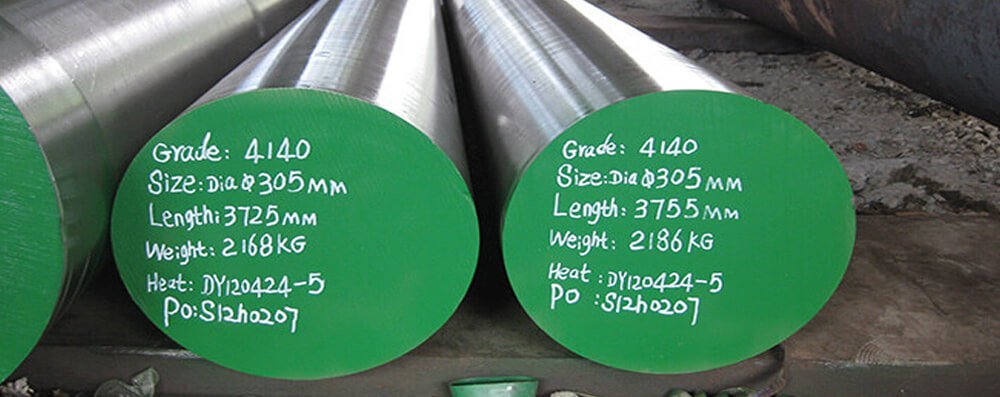Introduction
4140 alloy steel bar is a chromium-molybdenum low alloy steel known for its high tensile strength, toughness, and excellent fatigue resistance. It offers a great combination of strength, hardness, and impact resistance along with good machinability. 4140 is versatile and widely used in industries such as oil and gas, automotive, aerospace, and machinery manufacturing for critical components requiring high performance under stress.
Properties of the Grade:
- High tensile strength and toughness
- Excellent fatigue and abrasion resistance
- Good atmospheric corrosion resistance
- High impact resistance even in hardened conditions
- Good machinability in annealed and normalized states
- High hardenability and ability to be through-hardened
- Good dimensional stability after heat treatment
Uses/Applications of the Grade:
- Shafts and axles
- Gears and pinions
- Crankshafts
- Bolts and fasteners
- Oil and gas tool components
- Drill collars
- Machine tool spindles
- High-strength structural parts
- Aircraft landing gear parts
Chemical Composition:
| Element | Content (%) |
| Carbon (C) | 0.38 – 0.43 |
| Manganese (Mn) | 0.75 – 1.00 |
| Silicon (Si) | 0.15 – 0.30 |
| Chromium (Cr) | 0.80 – 1.10 |
| Molybdenum (Mo) | 0.15 – 0.25 |
| Sulfur (S) | ≤ 0.035 |
| Phosphorus (P) | ≤ 0.035 |
Dimensional Tolerances:
(Typical properties after quenching and tempering)
| Property | Typical Value |
| Tensile Strength | 850 – 1000 MPa |
| Yield Strength | ≥ 655 MPa |
| Hardness (Annealed) | ~ 197 HB |
| Hardness (Quenched and Tempered) | 24–32 HRC |
| Elongation | ~ 20% |
| Reduction of Area | ~ 50% |
| Impact Strength (Charpy V-notch) | High |
Physical Properties:
| Property | Typical Value |
| Density | ~ 7.85 g/cm³ |
| Modulus of Elasticity | ~ 207 GPa |
| Thermal Conductivity (at 20°C) | ~ 42.6 W/m·K |
| Specific Heat Capacity | ~ 460 J/kg·K |
| Coefficient of Thermal Expansion (20–100°C) | ~ 12.3 × 10⁻⁶ /°C |
Forging:
Forging Temperature Range: 850°C – 1200°C
Procedure:
- Preheat slowly to 850°C.
- Continue heating to 1150°C – 1200°C.
- Forging should not be carried out below 850°C.
- After forging, slow cooling is recommended in furnace or dry lime to prevent thermal cracking.
Heat Treatment:
-
Annealing:
- Heat to 800°C – 850°C.
- Hold for a sufficient time and furnace cool slowly.
- Results in improved machinability.
-
Normalizing:
- Heat to 870°C – 900°C.
- Air cooling to refine grain size and improve mechanical properties.
-
Hardening:
- Heat to 840°C – 875°C.
- Quench in oil or water.
-
Tempering:
- Temper immediately after quenching.
- Typical tempering range: 540°C – 680°C depending on desired hardness.
Dimensional Tolerances:
- Hot Rolled Bars: As per ASTM A29 or relevant standard.
- Peeled or Turned Bars: Tolerances to ISO h9 or h11.
- Ground Bars: Tight tolerances as per ISO h6 or better on request.
Machinability:
- Good machinability in normalized or annealed conditions.
- Use carbide or high-speed steel cutting tools.
- Machining performance declines in hardened conditions but remains manageable.
- Coolants are recommended to improve tool life and surface finish.
Corrosion Resistance:
- Moderate corrosion resistance in normal atmospheric conditions.
- Not suitable for marine or highly corrosive environments without protective coating.
- Can be improved with surface treatments like galvanizing, plating, or nitriding.
Weldability:
- Fair weldability with proper precautions.
- Preheating to 150°C – 200°C is recommended.
- Post-weld stress relieving is advisable to minimize cracking.
- Suitable for MIG, TIG, and stick welding methods.
Available Form:
4140 Alloy Steel is available in:
- Hot Rolled Bars
- Forged Bars
- Peeled and Turned Bars
- Bright Bars
- Ground and Polished Bars
- Plates and Cut Pieces
Supplied in annealed, normalized, or quenched and tempered conditions as per customer requirements.
Conclusion:
4140 Alloy Steel Bar is a versatile, high-performance material offering an outstanding balance of strength, toughness, and wear resistance. It is highly valued in industries requiring durable components capable of withstanding mechanical stress and fatigue. With excellent machinability and adaptability to various heat treatment processes, 4140 steel continues to be a go-to choice for critical engineering applications where reliability and performance are essential.
Related Products : 16MnCr5, EN19, 42CrMo4, 20MnCr5, EN353, EN31, EN24, EN47, EN41B, SAE4140, SAE52100, SAE 8620, SCM420, EN36C, Maps


